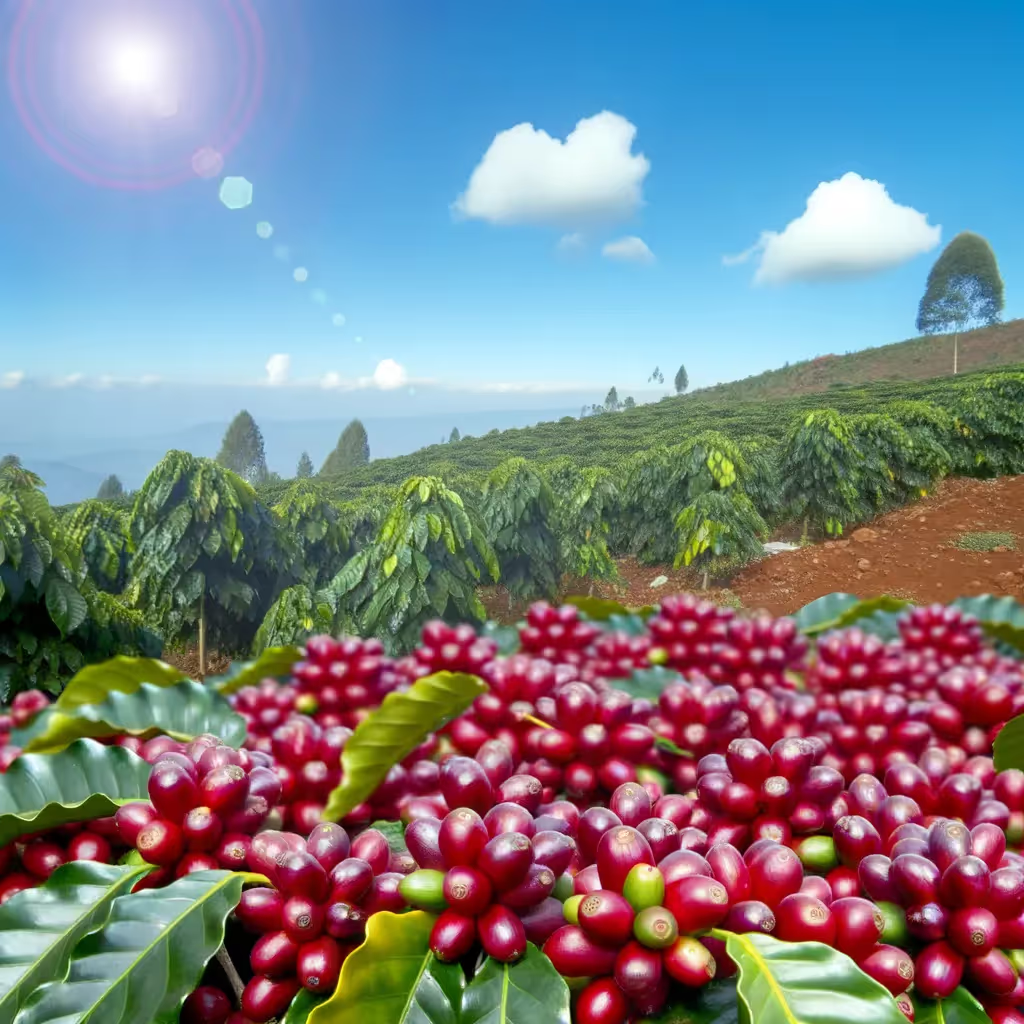Tanzanian Vs. Rwandan Coffee
This comparison explores the distinct qualities of Tanzanian and Rwandan coffees, highlighting their flavor profiles, growing conditions, and cultural significance in the specialty coffee world.

Brief Description
Tanzanian coffee is a hidden gem in the world of specialty coffee. Grown on the slopes of Mount Kilimanjaro and in the southern highlands, these beans offer a unique flavor profile that combines bright acidity with rich, full-bodied taste. Known for their wine-like acidity and black currant notes, Tanzanian coffees are often described as having a 'soft' cup with a gentle, sweet finish. The country's diverse microclimates and traditional farming methods contribute to the distinct character of its coffee, making it a favorite among connoisseurs seeking something extraordinary.
Rwandan coffee is a hidden gem in the specialty coffee world, known for its bright acidity, complex flavors, and clean cup profile. Grown in the high-altitude regions of this small East African nation, Rwandan coffee benefits from rich volcanic soils and ideal growing conditions. The country's tumultuous history has given way to a thriving coffee industry, with smallholder farmers producing some of the most sought-after beans in Africa. Rwandan coffee is characterized by its tea-like body, citrus notes, and often floral or fruity undertones, making it a favorite among coffee enthusiasts seeking unique and vibrant flavors.
Importance of Comparison
Comparing Tanzanian and Rwandan coffees is crucial for coffee enthusiasts seeking to explore the diverse flavors of East African beans. Both origins offer unique taste experiences, reflecting their specific terroir and processing methods. Understanding the differences between these coffees helps buyers make informed decisions based on their flavor preferences and brewing styles.
Key Attributes
Origin
Tanzanian
Rwandan


Consumer Guide
When choosing between Tanzanian and Rwandan coffee, consider your flavor preferences. Tanzanian coffee offers a wine-like acidity with black currant and dark chocolate notes, ideal for those who enjoy a full-bodied cup with a soft finish. Rwandan coffee, known for its bright acidity and complex flavors, appeals to those seeking a lighter, tea-like body with citrus and floral notes. Both origins excel in pour-over, French press, and cold brew methods. For a bolder taste, opt for Tanzanian; for a more delicate, nuanced flavor, choose Rwandan. Consider trying both to experience the full spectrum of East African coffee flavors.
Expert Opinions
Coffee expert Maria Rodriguez notes, 'Tanzanian coffee's full body and wine-like acidity make it a standout choice for those who enjoy a robust cup.' Meanwhile, roaster John Smith observes, 'Rwandan coffee's bright, clean profile and complex flavors offer a unique tasting experience that showcases the best of African coffee.' Both experts agree that these origins represent the diversity and quality of East African coffee production.
FAQs
Tanzanian coffee is known for its black currant, citrus, and dark chocolate notes with a full body and wine-like acidity. Rwandan coffee offers citrus, floral, and red berry flavors with a lighter, tea-like body and bright acidity.
Both countries grow coffee at similar altitudes (1200-2000m), but Tanzania's beans are often grown on the slopes of Mount Kilimanjaro, while Rwanda's benefit from rich volcanic soils. These unique terroirs contribute to the distinct flavors of each origin.
Both Tanzanian and Rwandan coffees excel in pour-over, French press, and cold brew methods. The choice depends on personal preference and desired flavor intensity. Pour-over highlights the bright acidity, while French press emphasizes body and richness.
Tanzania produces significantly more coffee, with an annual production of about 50,000 metric tons, while Rwanda produces around 16,000 metric tons. This difference reflects the larger size of Tanzania and its longer history of coffee production.
Both Tanzanian and Rwandan coffees typically undergo washed, natural, and honey processing methods. The choice of processing significantly impacts the final flavor profile, with washed coffees generally offering cleaner, brighter flavors, and natural processed beans providing more fruity, complex notes.
Coffee production plays a crucial role in both countries' economies. In Tanzania, it's a major export crop supporting many smallholder farmers. In Rwanda, the coffee industry has been instrumental in the country's economic recovery, providing income for numerous small-scale producers and gaining international recognition for quality.
Conclusion
Both Tanzanian and Rwandan coffees offer unique and delightful experiences for coffee enthusiasts. Tanzanian beans are ideal for those who prefer a full-bodied, wine-like acidity with rich chocolate notes, while Rwandan coffee appeals to lovers of bright, complex flavors with a lighter body. Both origins showcase the best of East African coffee production, with their high-altitude growing conditions and meticulous processing methods. Whether you choose the bold flavors of Tanzania or the nuanced profile of Rwanda, you're sure to enjoy a cup that reflects the rich coffee heritage of these remarkable regions.






